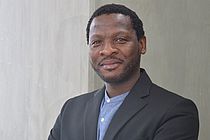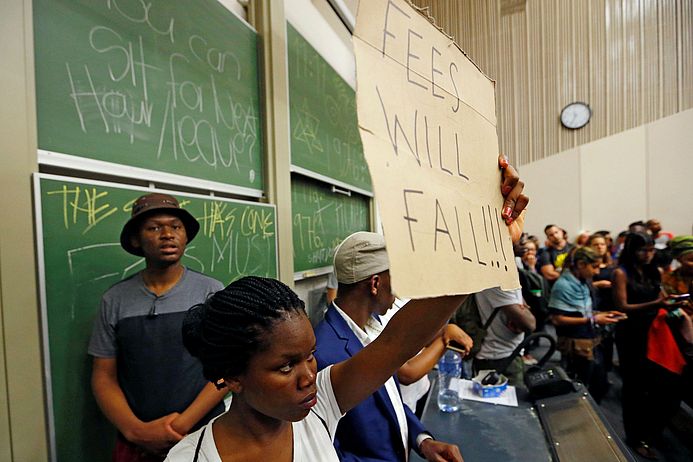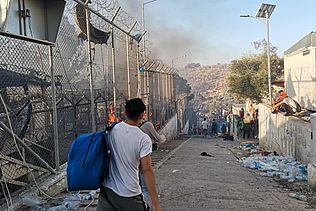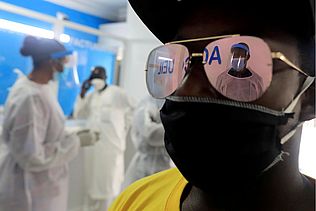Your exclamation “Apartheid is dead, viva neo apartheid” is key to understand your concept of postcolonial perspectives. I was wondering if the hope for political and economic changes after the official end of apartheid has been a projection.
After the Apartheid era ended all of us were hopeful, in South Africa and in the whole world. South Africa in the global imagination is very special. Because as Derrida said, apartheid was the last institutionalized racism. So South Africa has always been important in the global imagination and the whole world thought that there would be a good solution. What made that even more hopeful for all of us, utopian, naïve maybe, was the fact that there was no war. There was no civil war unlike in other parts of the world like in Kosovo and the Balkans or Ruanda. But in South Africa, the notion of a miracle gave all of us hope. But the difference is that there was quite a bit of European imagination, that there was some sort of naivety and wilful ignorance.
How come that all these questions are not on the table? Not in 1994, not today.
Let’s take a look at the antiapartheid movement. It was the most successful international Solidarity Campaign after the anti-slavery movement. What happened? Was is for fun?
Apartheid was not just about discrimination, the issues were economical: Who owns the land? Who owns the economy? South Africa was a settler colony since 1652. Not only the education system is Eurocentric till today but the land question is also still on the table. Only 8 percent of the land was restituted. White people still own 70 percent of the land. But the land is who we are, it connects us with the world. The South African economy is still in the hands of white people. Germany, GB and United States had links with big South African companies and the apartheid government. So they knew that there cannot be a proper change unless the economy is redistributed. For me it was an epistemology of ignorance because it benefits the West.
Since the 1990s, the thesis has been circulated that civil war would have occurred if the land question had been on the agenda with the end of apartheid. Was that just Western rhetoric?
The notion that you don’t touch the land because you are preventing civil war is false. War was not prevented. There is a war of poverty, 45,000 people live below the poverty line. There is war of exclusion. There is war on women which is connected: it’s socio-cultural but at the same time economical. In fact, we prevented the war against white people. The second mistake with that kind of notion is that between 1988, before Mandela came out, and 1996 after the democratic change, more people were killed in South Africa than during apartheid and colonialization. More people were killed than even before in so called black-on-black violence engineered by the apartheid state. Number three: Mandela, you know as good as he is, he is being disingenuous. From the beginning, the ANC was never a revolutionary party. It was a party for black elites to be part of the economy. Their fight was for inclusion in the white society, their fight was not for a radical redistribution of the economy, the ANC never planned to touch the land issue. It was not magic or god’s work that the ANC became the main liberation movement. It was well-chosen by western powers, because they were safe kind of revolutionaries.
This political decision you describe comes with a package for the survivors as they never got adequate reparation.
That’s why I talk about neo-apartheid today. So it’s not apartheid and it’s not freedom either. The fundamental organizational structure of the economy is still the same based on black exploitation, based on exclusion, based on war against women so that women must be burdened with reproduction but also with working. So the main colonial system of the economy continues today. Lots of continuities. You mentioned a very important point which is the intergenerational trauma, the intergenerational poverty, the intergenerational marginalization goes from family to family. If my father disappeared and couldn’t get a job, I couldn’t go to school and I become poor and I can’t go to school. So it’s intergenerational. For white people its intergenerational privilege.
Is this inequality the birth of the post-colonial movement in South Africa?
So when the kids today are fighting for #rhodesmustfall or #feesmustfall. It’s a very serious thing that they are saying. They don’t say we want water or electricity, they say the whole building is false, the foundation of the new South Africa is rotted, there is no foundation here. And therefore we are not born free, even though we were born after 1994. So really the situation today when you see 2,000 protests, 2,000 protests: it’s insane. And of course underreported in the media. The townships are burning, xenophobia which is an explosion, a deflection of anger towards other vulnerable people. Instead of confronting the system that has made you poor you look at another vulnerable person and you take it out on them. The war on women, the war on lesbians, black lesbians especially, are being killed every single month and it’s not a big scandal. So the situation today is a situation of neo-apartheid, neo-colonialism where a few black people become very rich billionaires, like multi billionaires including our president. Our president is a billionaire even though he is not a business person. You can even talk about Mr. Mandela. When he died he owned a lot of properties, we don’t know how. We do not ask questions because he is our father. So it is a neo-apartheid because the original beneficiaries of apartheid are remaking exclusion with some black people in alliance. Very rich black people and historically white people in alliance to maintain South Africa as it is.
Do you need these very few super rich black people to justify a neo-colonial system?
Yes. You need a few to point out that obviously everyone can make it. But this does not change the structure of society that continues to produce exclusion. At the same time social movements have been killed by the state for decades. The massacre of Marikana in which many miners were killed during a strike in 2012 happened because black people are saying ‘we can’t be slaves anymore’. This massacre was only a spectacular manifestation of neo-apartheid – the fact that black humanity remains suspect, and that the South African society replenishes itself on the basis of the confinement of the majority of black people in the zone of non-beings. The fatal error that the miners committed was to seek to end their slavery-like existence through recourse to tools from the zone of beings. Our president is co-owner of the mine and he had to deal with the situation. The system needs these black people in order to protect the privilege of other black people. Today South Africa is a ticking time bomb and violence is part of the social fabric in South Africa. People can’t take it anymore. Under Mandela we were told to be patient, under Mbeki we were told it is an African renaissance, under Zuma there was a lot of corruption. And xenophobia is poor people in the township killing other poor people. But next time they will go from the townships to the suburbs.
Does the rise of the #mustfall movements – the fight towards a decolonised, just and fair society –make a change in the moral fibre of South Africa and even have a global impact?
I see this new movement making very good points about the cultural code of betrayal. They are right to say that we were not given freedom. The movement is targeting ”non-white” students experience of invisibility and marginalisation, epistemic violence and institutional racism. They demand the unmasking of whiteness and coloniality, move away from neoliberal framework, center African experience and knowledges. So the very good critique against that, very good critique about the Eurocentric education system, very good critique against our universities that alienate us and make us mini-Europeans, very good critique about market-based universities - but it is not going to the core of it. OK so tomorrow you change the curriculum, it becomes African. Tomorrow you create African universities but the economic situation will still be the same because you have not been able to do a proper political analysis of the economy. So for me I don’t see them making deep connections between local capitalists and global capitalists and the way to defeat this. You need to have linkages with people overseas in order to defeat the neoliberal empire. You cannot defeat it at home, it needs to be a cosmopolitan insurgency from the ground up.
We look at decolonization and liberation movements from a national/regional perspective. This is a key to a deep understanding, I learned this from your reflections on colonialism and apartheid in South Africa. Now, when it comes to liberation and deep decolonization, what role does the universal and the emerging global movements with their different regional and historical roots play?
Historically colonised countries share the same challenges and concerns. They all have to contend with the global matrix of coloniality in a sense that they are all relegated to the margins of global political, economic and epistemic power. Historical colonisers continue to exert a lot of influence in these countries. In a sense, the empire still exists, except that it is now more diffused than in the past and it is entrenched not via the bible and the gun but through epistemic colonialism, economic subjugation, cultural cannibalism, unfair distribution of ecological degradation etc. Now, because this is a global system of oppression and peripherilisation, there is need for a global counter-hegemonic push-back. Democratic and popular South-South alliances and cross fertilisation of ideas, strategies and tactics are important in this regard – what Boaventura de Sousa Santos calls Subaltern Cosmopolitanism and Walter Mignolo calls Decolonial Cosmopolitanism. At the same, the emergence of decolonial, anti-capitalism, ecological justice, radical feminism and anti-racism groups within the Global North is also an encouraging development. These groups constitutes the South with the Global North or the Other Europe and their role should be to implode the empire from within.
Around which common horizons should and could such a movement develop?
South-South counter-hegemonic alliances should have as their horizons a democratic, anti-heteronormative, anti-patriarchal, anti-racist, anti-capitalist and anti-epistemic coloniality. What I am saying is that such alliances should not just be based on alliances for the sake of alliances – otherwise they will replicate Big Man-Authoritarian politics aimed to replace coloniality of the white man with that of the black man – to put it crudely. Bottom-up alliances outside the organisation of States are important. These common horizons and organising principles also apply to the counter-hegemonic Europe or the South-in-the-Global-North. In addition, alliances between anti-colonial groups in the South and anti-colonial groups in Europe must be based on mutual respect and solidarity to avoid cultural imperialism and epistemic cannibalisation by so-called radical partners from the North.
Anne Jung from medico international conducted the interview at the end of 2019, before the corona pandemic began.
Translation by Mamisoa Rajosvah.

Tshepo Madlingozi
Since 2019 Tshepo Madlingozi has headed the Center for Applied Legal Studies CALS at the Witwatersrand University in Johannesburg. He came into contact with medico a few years after the end of apartheid as a young activist from Khulumani. For many years, he served as the national advocacy co-ordinator and a board member of the Khulumani Support Group, which represents over 85,000 victims and survivors of apartheid-era gross human rights violations.



